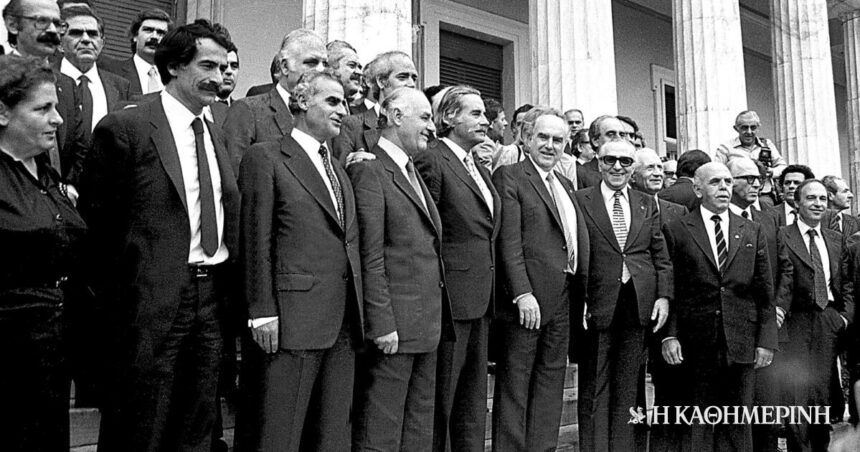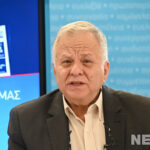Within only five years, that is, from the restoration of democracy in July 1974 to the official accession to European Economic Community, in May 1979, Greece had achieved three very important political successes, which from then until today determine its fortunes: First, the abolition of the extra-parliamentary forces of the past (palace, army, parastatal), which allowed the consolidation of a purely parliamentary system, then the introduction of a purely liberal constitution and, finally, the entry into the club of the most developed European states. The importance of those three political successes becomes clear only if we consider that since then – and despite the upheavals – parliamentarianism, liberalism and Europeanism have been the three great pillars of modern Greek democracy. And yet, in the October 1981 election, voters overwhelmingly rejected the party that built those pillars and brought to power another party that promised some sort of “change”. What happened;
Loyalty to the leader, opposition to the Right
In retrospect, both in academia and in the wider public debate, much ink was spent explaining his rise to power PASOK on the basis of different factors: its ideology, its organizational party structure, even the class struggle, since it was considered the “people’s party”. In reality, however, none of this could be true if the factor were missing from the equation. Andreas Papandreou. He was the main ideological source of the party, he completely controlled the party organization and he was the one who built the “PASOK people” through speech, slogans and the many other symbolic representations that, like a political magician, he used and finally imposed in the political life of the place.
I myself have written several hundred pages on the early post-political period and the PASOK phenomenon, which I can summarize here as follows: In 1981, PASOK won power because its leader managed to create a comprehensive party identity, which, as it suited gauntlet to people of various personal qualities, social references, ideological recruitments and political ideas, it proved to be politically majority and electorally victorious. Based on their new collective identity, all those people saw themselves as “progressives”, disliked anything perceived as having “right-wing” characteristics, and expected an undefined “change”.

There were two main components of the early Pasok identity: absolute loyalty to the party leader and leader of the “progressive” faction and also absolute opposition to the Right and, by logical consequence, to the politics of the governing party that represented it, i.e. the N.D.
Intense questioning of the political system
Papandreou was an eminently charismatic leader. Just like every other leader who belongs to the (very small) international club of charismatic leaders, Papandreou in the 70s, having full control over a powerful party of his own making, challenged the institutions that were the pillars of the new democratic system and he promised, if he came to power, a radically different establishment of the state – the famous “change” – based on some kind of “socialism”. The short and extremely spectacular path to power, therefore, was based on Papandreou’s successful attempt to question the trust in the three institutional pillars that he introduced – and with difficulty tried to consolidate, often against itself – the then “right” government of the country. The questioning of the political system was expressed by the continuous discrediting of the elected democratic government, which at the time was considered simply as “NATO’s changing of the guard in Greece” with the main purpose of serving the interests of “the local and foreign oligarchy”, as well as by the intense mobilization of society that expressed itself with marches, rallies, sit-ins and demonstrations for any kind of social demand.

PASOK abstained from the meetings of the Parliament both for the voting of the Constitution and for the ratification of the country’s accession to the EEC.
The questioning of liberalism again had two aspects. First of all, Papandreou categorically rejected modern social democracy, promising the “socialist transformation of society” through some “third way”. But the main thing was that, during the voting of the 1975 Constitution, PASOK chose to abstain from the Parliament, denouncing the Constitution under vote as “anti-democratic (and) that could be compared to the “constitutions” of the junta”. The questioning of the country’s European course was also intense since, as Papandreou argued, “the choice to join the EEC means the full integration of our society into the monopolistic, capitalist structure of the West.” As with the Constitution, PASOK chose in 1979 to abstain from the relevant debate on the ratification of the accession treaty in the Parliament, and from the official signing ceremony in Zappeio, despite the presence of many prime ministers of member states. On the contrary, Papandreou undertook to proceed with a referendum if he came to power.
Vertical confrontation aimed at power
The blind faith of PASOK’s followers in the person of the leader-leader combined with the distrust towards the new parliamentary, liberal and pro-European political system established by the (considered “right”) N.D. of Karamanlis, created the conditions of acute polarization, which later became the most defining element of our democracy. Several years later, Leonidas Kyrkos, one of the leaders of the renewalist and pro-European Left, in one of his last interviews (with Alexis Papachelas) summarized the events of the early post-political period in the following way: “And it prevailed (at that time ) the other logic. The logic of the vertical confrontation of Andreas Papandreou (who) saw nothing but the rise to power. And the rise to power meant a continuation of the right-anti-right dichotomy. Radiant hatred so that we can bring the world together” (“Kathimerini”, 3/12/2006). In this way, however, a powerful party and political identity was created which, as it was accepted by large sections of society, was to determine the future of political life in the country.
When it came to power in 1981, PASOK had already accepted “bourgeois” parliamentary democracy, but at the same time it maintained its strongly kinetic and popular-assertive character. The referendum on the EEC that its leader had promised during the pre-election period was quickly forgotten, as the country began to receive rich EU funds, which the government chose to use to finance a policy of benefits to selected social groups instead of a comprehensive national development program . Unlike other countries in the European periphery – such as Ireland, Portugal and Spain – who perceived their membership in the European Community as a prime opportunity for development, Greece remained suspicious of Europe. Refusing to fully comply with the logic and rules of the Community, the country pursued an uncoordinated and inflexible policy of left-wing populist nationalism, which gradually made it the “black sheep” of Europe. But the most important thing was that, during the years of the early PASOK governments, the liberal institutions of the state were significantly discredited, since the “people” and popular interests were considered to be above any institution. “There are no institutions, there is only the people”, as Papandreou himself characteristically declared at a popular gathering.
After the death of Andreas Papandreou, the party identity of a typical PASOK voter was still characterized by tolerance – if not preference – for extra-parliamentary kinetic political action, strong democratic populism and a great degree of suspicion towards the European Union and the common European policy. Those characteristics were so consolidated in the electoral base of PASOK that neither the Simitis governments nor the short administration of George Papandreou were able to reshape them. In the end, in a seemingly only paradoxical way, they led to the electoral collapse of the once all-powerful party. Because when, from the beginning of the crisis that broke out in the country in 2010, the official PASOK decided to definitively stand in favor of parliamentarism, liberalism and Europeanism, just like the “right” N.D., the great mass of its voters in he left in favor of another party that directly appealed to his fundamental identity – that is, those that Andreas himself had forged since the 70s.
Mr. Takis S. Pappas is a political scientist, former university professor and author. Among his books is “The charismatic party: PASOK, Papandreou, power”.
DILIGENCE: EVANTHIS HATZIVASSILEIOU




